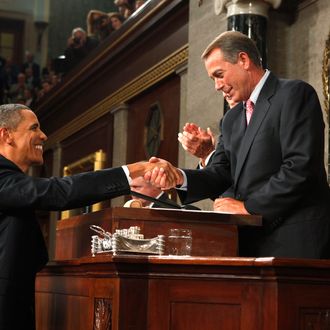
You know how the supercommittee failed because the two parties couldn’t compromise on a plan to reduce the deficit? That’s the story all the media is reporting. It’s all wrong. The reason for the deadlock wasn’t that the two parties couldn’t compromise, it’s that they don’t agree on what problem they’re supposed to solve. And once you understand this, then you can see that the supercommittee didn’t actually fail.
If you want to understand why the supercommittee succeeded, you need to go back and recall why we have it in the first place. When Republicans took control of the House of Representatives this year, right-wing activists began to fixate on the debt ceiling. Conservatives began to insist that the debt ceiling must not be lifted at all, or that the House should agree to lift it only in return for massive concessions.
But what concessions? The trouble for House Speaker John Boehner was that distrustful conservatives were likely to paint almost any agreement he made with President Obama as a sellout. Indeed, the logic was perfectly circular: Anything that a socialist like Obama would agree to would have to be a sellout, wouldn’t it? So Boehner had to establish, in advance, a bright line that would delineate success. The arbitrary but finite line he drew was that he would agree only to raise the debt ceiling by an amount equal to the amount of budget cuts he could obtain. At the same time, Boehner could not agree to any tax increases.
This locked him into an impossible position. Either Obama had to agree to massive budget cuts with zero increase in tax revenue – something Obama couldn’t agree to without destroying his standing with the Democratic base and likely inviting a primary challenge – or else Boehner could drop his demand and probably lose his speakership to an angry conservative revolt. Or else Boehner would possibly crash the world economy.
The supercommittee was the way out. It forced Congress to agree to $1.2 trillion in deficit reduction, or else automatic budget cuts would go into effect. But the key detail was that the budget cuts would not happen until 2013. Meanwhile, the debt ceiling would be lifted through the 2012 election. Between now and then, the two parties can fight over what to do about the automatic budget cuts scheduled to take effect. That’s not really the important thing. The important thing is that the debt ceiling is no longer on the table.
The whole plan was to start talking about something other than the debt ceiling, in hopes that the tea party would find some different shiny object to pick up and try to smash with a rock. And it worked!
Now, it’s true that the committee failed to get a bipartisan plan to reduce the deficit. But that was never going to happen. I’ll explain that part later today. The real goal of the supercommittee was to keep partisan deadlock from wreaking economic havoc.






























